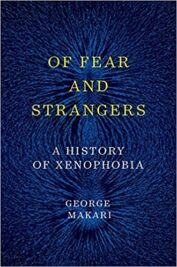
By George Makari. Chronicles the rise of xenophobia, from its popularization and perverse misuse to its spread as an ethical principle in the wake of a series of calamites that culminated in the Holocaust, and its sudden reappearance in the twenty-first century. Investigates xenophobia’s evolution through the writings of figures such as Joseph Conrad, Albert Camus, and Richard Wright, and innovators like Walter Lippmann, Sigmund Freud, Jean-Paul Sartre, Simone de Beauvoir, and Frantz Fanon. Weaving together history, philosophy, and psychology, offers insights into varied, related ideas such as the conditioned response, the stereotype, projection, the Authoritarian Personality, the Other, and institutional bias. Offers a unifying paradigm by which we might more clearly comprehend how irrational anxiety and contests over identity sweep up groups and lead to the dark headlines of division so prevalent today. Read more.
